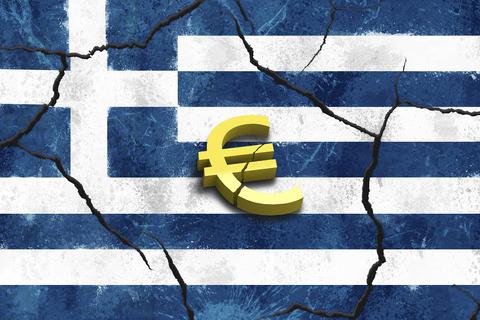By Tim Worstall, Forbes
I’m a little out of step with general opinion on the subject of Greece and the euro: I think the euro itself is a bad idea (as I also think that the existence of the European Union itself is a bad idea) and it’s a bad idea made very much worse by being extended to places like Greece, Portugal, Spain and arguably even Italy and France where it simply shouldn’t have been extended to. So I’m clearly extremely biased on this subject, although I can find support for my view in the theoretical literature on optimal currency areas.
I’m also along with the straight majority view that either a default or at the very least a haircut on Greece’s debt burden is a sensible idea. When a debt burden can’t be paid the sensible thing to do is to cut it rather than try to impose some vast amount of unproductive pain and suffering. With a company this is bankruptcy (and it’s the defining feature of well operating capitalism to have a swift, possibly even brutal, system to deal with the inevitable failures) and with a country it’s some form of sovereign default and or debt haircut. That’s just what has to be done and if it wasn’t for this pesky euro that’s what would have been done with Greece three and four years ago.
The major worry was, of course, contagion. Not that that would have bothered me because I think the euro’s a bad idea but it did worry those in favour of it. But that worry now seems to have receded:
The European Central Bank has warned that a rupture of monetary union and Greek exit from the euro could have dramatic consequences, but insisted that it has enough powerful weapons to avert contagion.
Mario Draghi, the ECB’s president, said it would be far better for everybody if Greece recovers within EMU but made it clear that the currency bloc is no longer vulnerable to the immediate chain-reaction seen in earlier phases of the debt crisis.
So, Grexit could be dealt with. Wolfgang Munchau is in the interesting position of arguing that the default is necessary, Grexit not, but I fear that he’s not quite right. Take this for example:
The economic case for a debt default is overwhelming. It is hard to see how Greece can ever service its debts as agreed. Even in the creditor countries few people are under illusions about Athens’ long-term debt-servicing capacity. Full servicing would require huge primary surpluses — that is, surpluses before payment of interest on debt. It would leave Greece trapped in a debt depression for a long time. The scheduled primary surplus for 2016 is 4.5 per cent, which is bordering on the insane. Athens absolutely needs to default.
Well, no, not really, that’s the previously scheduled primary surplus for next year. And it’s been pretty obvious in the current negotiations that everyone’s quite happy with relaxing this, down to perhaps the 1.5% that is scheduled for this year. And the reason for this is the following, as Munchau correctly notes:
On whom could, or should, Greece default? It could default on its citizens by not paying public-sector wages or pensions. That would be morally repugnant and politically suicidal for the Syriza-led government. In theory, it could default on the two loans it received from its EU partners, though it is not due to start repaying the first of those until 2020, and the second in 2023. It could also default on the remaining private-sector bondholders but that would not be a good idea. Greece might need private sector investors later.
It could also default on the IMF and the European Central Bank. The IMF is expecting a series of repayments. The ECB wants its money back in the next few months on debt it holds on its books. Defaulting on the IMF and ECB is the only option that would bring genuine financial relief in the short term.
The total debt burden is indeed such that no one has ever actually managed to pay back debts of such size of GDP. Britain managed to get WWI and WWII debts down without default but did so through inflation more than anything else which is a form of default in itself. And modern financial markets wouldn’t allow someone to get away with that. But the fact that huge chunks of debt aren’t repayable until long into the future mean that the commonly quoted debt to GDP ratio isn’t quite as relevant as many think. We can reduce a debt burden in at least two ways. Reduce the amount of the debt or reduce the interest on it and extend the terms (effectively, on the official portion of the debt, allowing it to be inflated away without that market reaction that would stop it). Which has already been done. Greece can repay with a 1.5 to 2% primary surplus. And while it’s not exactly and easy ride trying to engineer that it’s entirely possible.
And, of course, if the debt can be paid, given the lax terms, then there’s no necessity for Grexit either.
Which is where I end up: I think both a default and Grexit would be highly desirable things to happen. However, I also insist that neither are necessary, as the debt repayment schedule is such that Greece could run the required surpluses to meet the generous terms and interest rates. What I think is actually going to happen is that someone, along the line, makes a mistake. Some slip between what was meant as a bargaining position and what is thought of as a red line and Greece then slips into Grexit as the banking system falls over. And given where bond yields are, up at 28% or so on some maturities last week, it would seem that the markets consider that at least a likely, if not highly likely, outcome.









